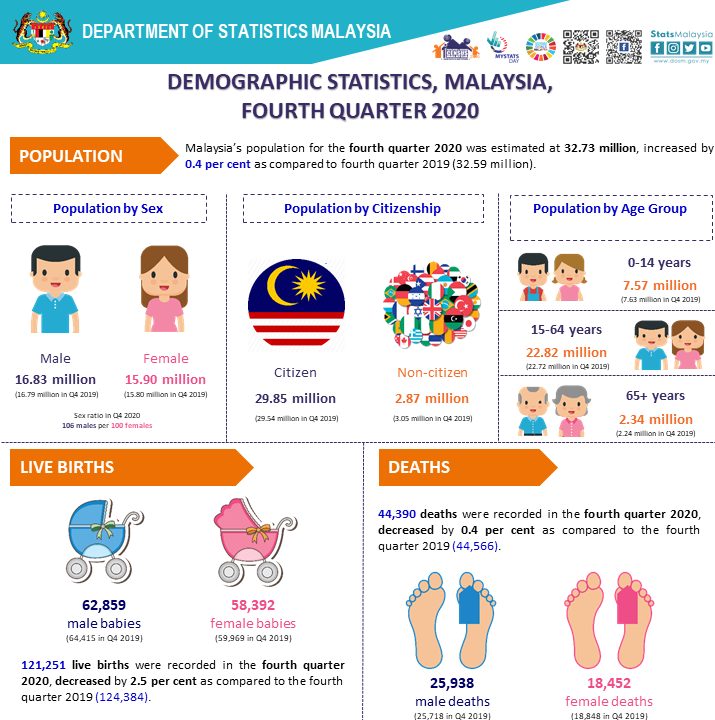 Malaysia has made important progress in the production of vital statistics in the country over the past few years. The Department of Statistics Malaysia (DOSM) and the National Registration Department (NRD) have a long-standing relationship and are continuously improving their collaboration to facilitate the sharing of birth and death registration records to produce vital statistics. As a result, the data exchange protocols between the two agencies gradually evolved from hardcopy documents to monthly online transfers since 2016. This has allowed DOSM to produce quarterly statistics on births and deaths and to shorten the timeframe in producing annual vital statistics from 24 months to less than 12 months.
Malaysia has made important progress in the production of vital statistics in the country over the past few years. The Department of Statistics Malaysia (DOSM) and the National Registration Department (NRD) have a long-standing relationship and are continuously improving their collaboration to facilitate the sharing of birth and death registration records to produce vital statistics. As a result, the data exchange protocols between the two agencies gradually evolved from hardcopy documents to monthly online transfers since 2016. This has allowed DOSM to produce quarterly statistics on births and deaths and to shorten the timeframe in producing annual vital statistics from 24 months to less than 12 months.
However, the COVID-19 pandemic had a disruptive effect on this system. The offices of NRD had to close due to the implementation of the Movement Control Order to prevent the spread of the virus, since birth and death registration are not included as essential services in the Federal Constitution of Malaysia. Registration offices were fully closed from mid-March to mid-May 2020, and later only available by appointment. NRD also offered an extension of up to 90 days to register births and deaths after the order was lifted. As a result, from mid-March 2020 birth and death registration data accessible by DOSM represent only a fraction of the expected births and deaths. In parallel to the NRD, the Ministry of Health registers and keeps records of births within and outside its facilities as well as deaths within its facilities and the Royal Malaysian Police keep records of deaths outside of health facilities. These records are transmitted online to NRD for issuance of birth and death certificates. Unlike NRD, both agencies continued operating during the Movement Control Order. DOSM only has access to the records consolidated and verified by NRD, and it has no direct access to the records of the Ministry of Health and the Royal Malaysian Police. These data could not, therefore, be used for vital statistics.
DOSM still produced its Vital Statistics report for the first quarter of 2020, but in the absence of complete data, it resorted to estimation methods based on time-series data from the past 10 years, as well as methods more specific to the situation. For example, DOSM considered the drop in the number of road accidents and the late registration of births and deaths due to the Movement Control Order. The department was able to use past experience, especially the adjustments performed on death data in Sabah Province, to compensate for underregistration.
The pandemic, by bringing an unexpected challenge to civil registration processes in many countries, highlighted the need for resilient systems such as the one in Malaysia. This is especially critical considering the importance of accurate and timely data to respond to crises. The prompt action from DOSM is proof that human resources are a key element to a well-functioning CRVS system, with the application of complex demographic models to ensure the continuity of vital statistics. However, there is a need to further strengthen the collaboration with the stakeholders and the potential to have access to their data in times of emergency. CRVS stakeholders in Malaysia have learned the importance of enhanced CRVS data sharing and subsequently a data sharing agreement was formalized between the Ministry of Health and DOSM, which will certainly lead to a more resilient CRVS system.
